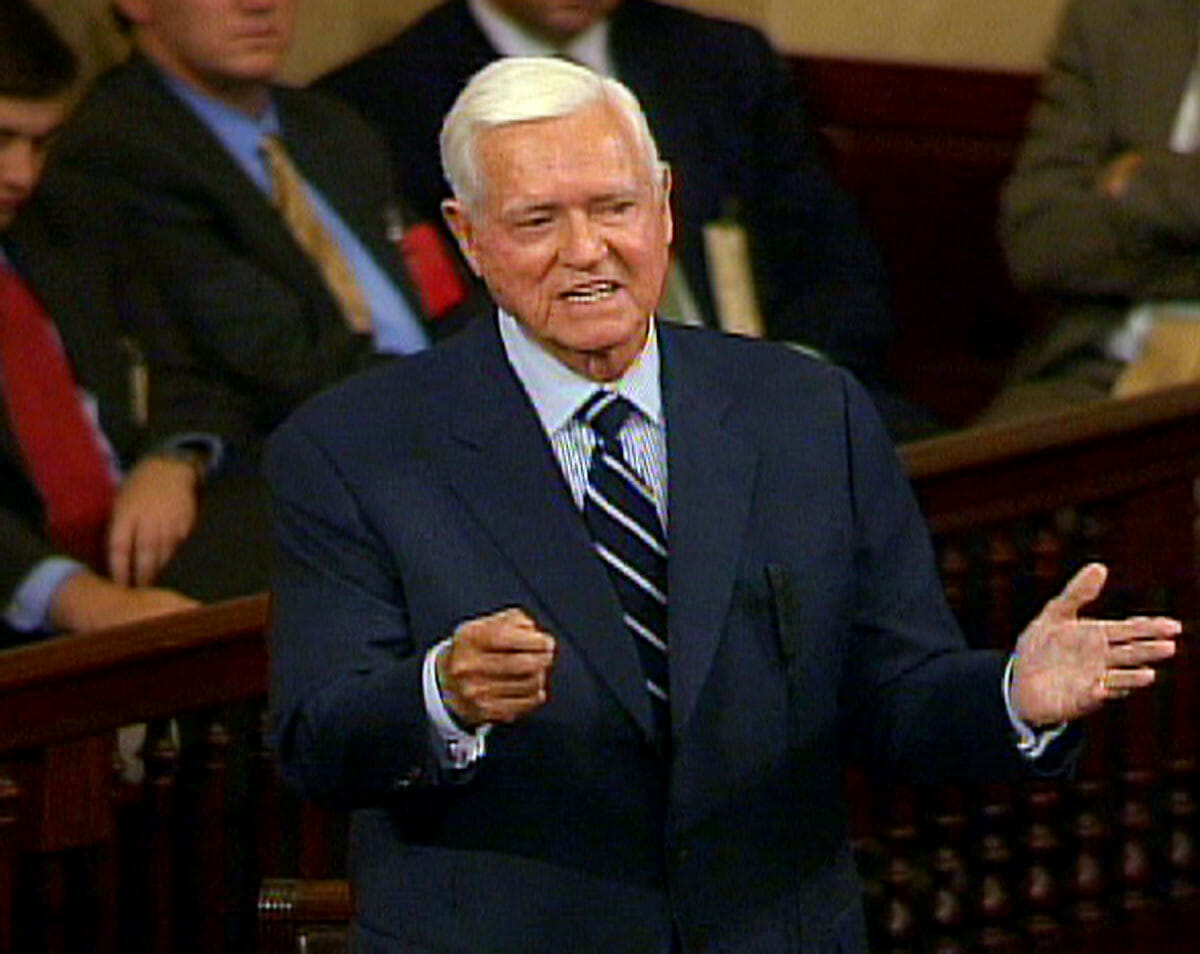
Mourners gather for funeral of SC's Ernest 'Fritz" Hollings
CHARLESTON, S.C. (AP) — As a college student fighting for racial equality in the early 1960s, Jim Clyburn was invited to the office of then-Gov. Fritz Hollings in an attempt to assuage racial tensions bubbling on the campus of South Carolina State University.
Clyburn, now the majority whip and third ranking Democrat in the U.S. House, said he wasn’t sure how the governor would receive him and the other protesters. After all, Hollings had campaigned previously against school desegregation.
But during their meeting, Clyburn said that he could sense a change in Hollings.
Clyburn told a crowd of hundreds at Hollings’ funeral Tuesday that even though the Southern Democrat asked the activists not to tell reporters he had been sympathetic to their cause, “He opened up to us, and we opened up to him.
“I knew that we had just heard and felt what was in him.”
Hollings died April 6 at his home on Isle of Palms at age 97.
The funeral at Summerall Chapel at The Citadel, Hollings’ alma mater, capped three days of mourning for the former governor and longtime U.S. senator. Hundreds of former staffers, lawmakers, friends and relatives attended.
Earlier, hundreds of mourners filed past Hollings’ body as it lay in repose at the state Capitol.
The long arc of Hollings’ career, from his days at The Citadel to service in World War II and more than five decades in public service, were recalled by Clyburn and others, including former Vice President Joe Biden , Hollings’ desk mate and friend in the Senate for more than 30 years.
Biden said Hollings, then chairman of the Democratic Senatorial Campaign Committee, helped him not only to win his seat in 1972 but also to summon the strength to occupy it following the deaths of his first wife and daughter in a car crash.
“He was also there for me when I was at the bottom,” Biden said, calling Hollings and wife Peatsy “the first people to bring me back from the black hole that I was in.”
Republican Gov. Henry McMaster, who challenged Hollings in 1986, recalled Hollings as “the magnificent lion of South Carolina.” McMaster brought a moment of levity after a mostly somber Biden eulogy as he recalled his campaign staff suggesting that Hollings should take a drug test, to which Hollings responded “that he would take a drug test if (McMaster) would take an IQ test.”
Southern racial dynamics were a running theme throughout Hollings’ career, which began with three terms in the state House, followed by his election as governor in 1958. Although he had campaigned against desegregation, Hollings later built a national reputation as a moderate. In his farewell address as governor, he pleaded for legislators to peacefully accept integration of public schools and the admission of the first black student to Clemson University.
“This General Assembly must make clear South Carolina’s choice, a government of laws rather than a government of men,” he told lawmakers. Shortly afterward, Clemson was peacefully integrated.
In his 2008 autobiography, “Making Government Work,” Hollings wrote that in the 1950s “no issue dominated South Carolina more than race” and that he worked for a balanced approach.
“I was ‘Mister-In-Between. The governor had to appear to be in charge; yet the realities were not on his side,” he wrote. “I returned to my basic precept … the safety of the people is the supreme law. I was determined to keep the peace and avoid bloodshed.”
Hollings had served 38 years and two months when he retired from the Senate in 2005, making him the eighth longest-serving senator in U.S. history.
The sharp-tongued orator whose rhetorical flourishes in the deep accent of his home state enlivened many a Washington debate never reached the levels of influence he hoped. His bid for the Democratic presidential nomination was unsuccessful.
He sometimes blamed that failure on his background, rising to power as he did in the South in the 1950s as the region simmered with anger over segregation.
On Tuesday, Clyburn also recalled a more recent poignant moment with Hollings, who several years ago had asked his old friend to sponsor legislation removing Hollings’ name from a federal courthouse in South Carolina. “That’s unheard of,” Clyburn said, although he said it ultimately didn’t surprise him at all.
Hollings, he said, wanted his name removed to make room for U.S. District Judge Waties Waring, whose dissent in a case paved the way for the Brown v. Board of Education ruling that public-school segregation was unconstitutional. That kind of selflessness, Clyburn said, marked Hollings’ ultimate transformation from desegregation opponent to champion of equality and understanding.
“I was moved to tears because I know South Carolina well, and I thought I knew Fritz Hollings well,” Clyburn said, his voice cracking with emotion. “There was much more to him. … Thank God a man can grow. Fritz grew, and I grew along with him.”
___
Meg Kinnard can be reached at http://twitter.com/MegKinnardAP
The Western Journal has not reviewed this Associated Press story prior to publication. Therefore, it may contain editorial bias or may in some other way not meet our normal editorial standards. It is provided to our readers as a service from The Western Journal.
Truth and Accuracy
We are committed to truth and accuracy in all of our journalism. Read our editorial standards.
Advertise with The Western Journal and reach millions of highly engaged readers, while supporting our work. Advertise Today.












